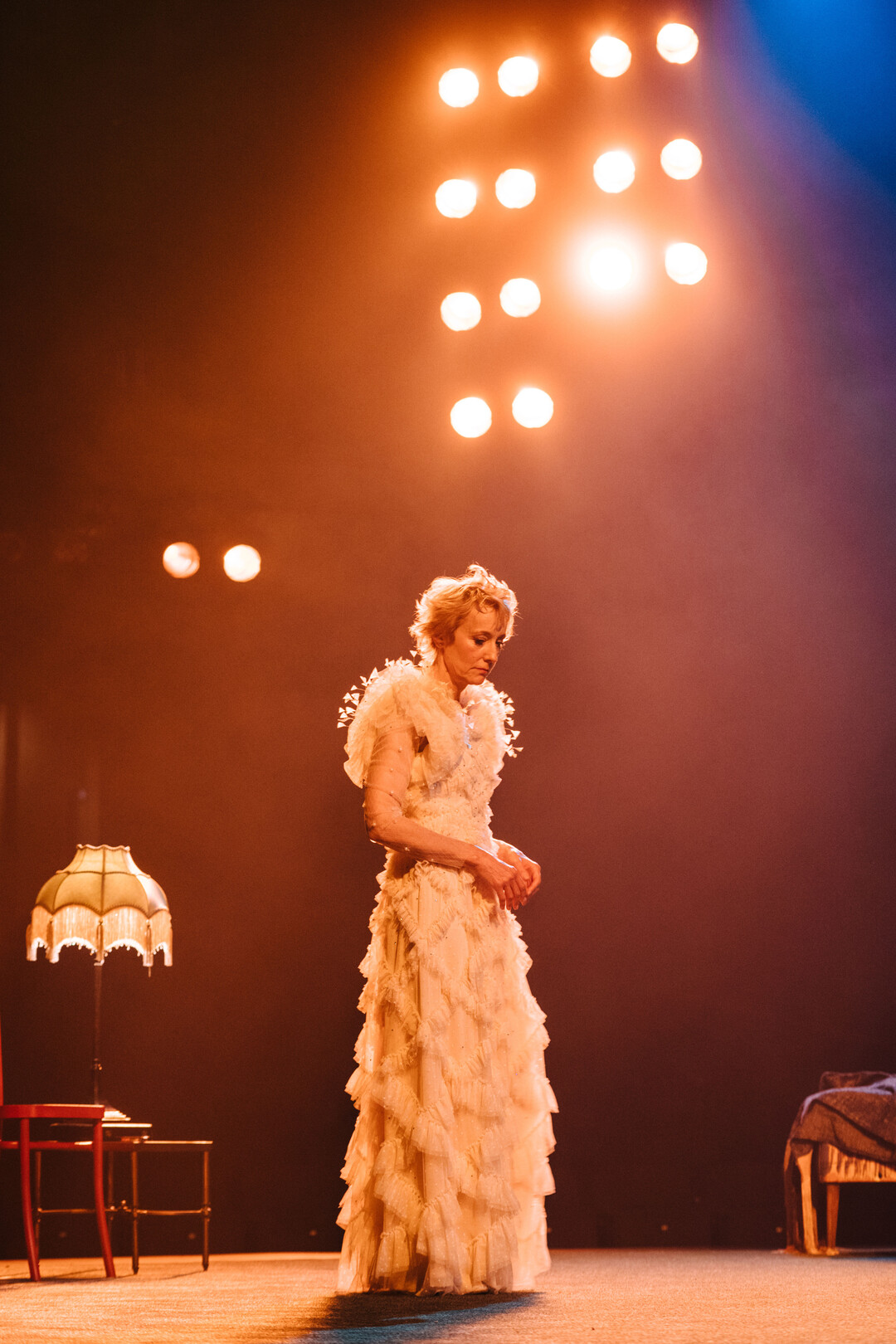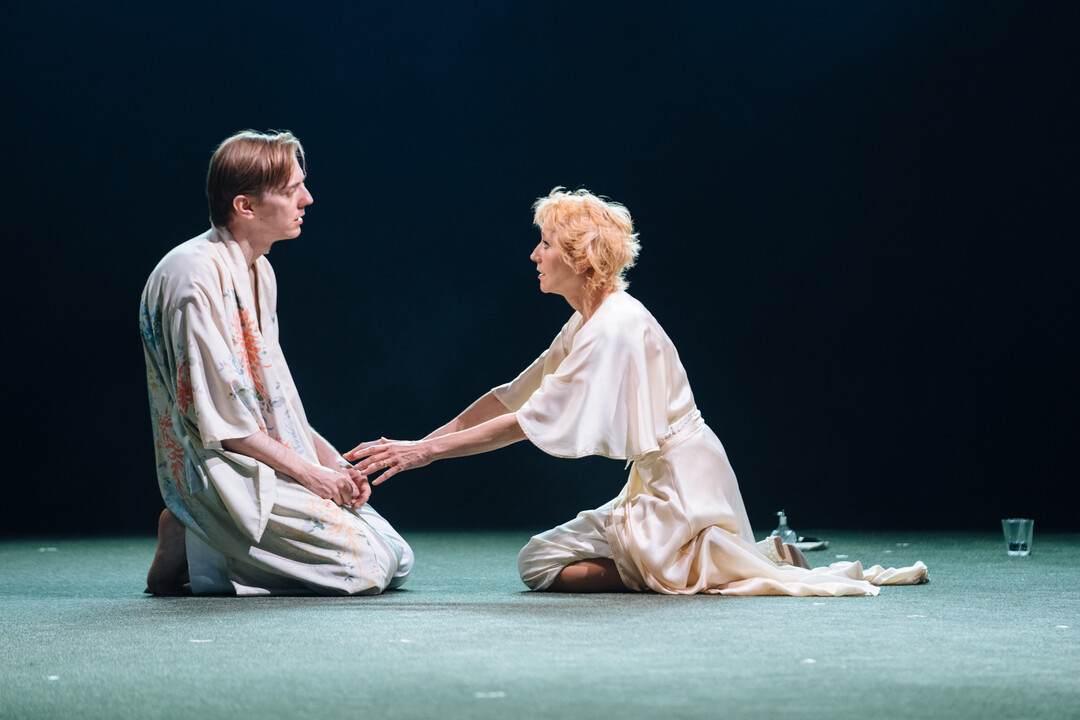Sometimes I go outside and look at our kitchen drain. Where there should be a vortex there’s a largely static pool. Tree roots have recently grown through the old pipes, their clumps colonised with fat, dog hair and coleslaw bits, and though a bit of handpumping will shift some of the stale water for a while, it really needs systemic attention from Dyno-rod. A good Dyno-rodding is what Chichester’s new production of Noel Coward’s The Vortex needs too.
The catchline for the staging is that a real-life mother and son play the sex-mad mother and drug-addicted son of the drama, the subtle and gamine Lia Williams and the well-regarded Joshua James, but if anything this reality connection stills rather than stirring the hothouse drama Coward intended. Aged 25, young Noel was the toast of the West End in 1924 for his comedies, but The Vortex was his first commercial hit, an attempt at plumbing the bottomless darkness of one's sexual being, for one thing, and addiction, for another.
Nicky Lancaster is Coward’s avatar, a young jazz composer who we must believe hides the socially fatal secret of his sexuality under a false engagement to one “Bunty”, and copes with the stress by taking cocaine. His mother, the floridly named Florence Lancaster – who is at one point unkindly characterised as “elderly” but is probably no more than 50 – is equally at social risk for her addiction to quick affairs with young men, but has the money and society status to get away with it for the time being. Neither premise stands up 99 years later, but director Daniel Raggett has attempted to haul and tighten the whole thing into today’s style of speech and behaviour as if to repoint its relevance.
 Yet the whole point of Coward’s timelessness is that demons are personal, they belong individually and irrationally to people locked inside certain contexts and psychologies, those vortices. His extravagant lines are treasures and mantraps. It’s tragic and comic to consider a woman as teetering between being “young indefinitely” and “beautifully old”, but only in a tragic and comic era where pretence and deceit were the female lot. And describing oneself as “gay” in the archaic Twenties sense can’t be done by a twentysomething man when his mother’s just asked him to go to a Rolling Stones concert with her.
Yet the whole point of Coward’s timelessness is that demons are personal, they belong individually and irrationally to people locked inside certain contexts and psychologies, those vortices. His extravagant lines are treasures and mantraps. It’s tragic and comic to consider a woman as teetering between being “young indefinitely” and “beautifully old”, but only in a tragic and comic era where pretence and deceit were the female lot. And describing oneself as “gay” in the archaic Twenties sense can’t be done by a twentysomething man when his mother’s just asked him to go to a Rolling Stones concert with her.
Presumably, given the circular amphitheatre of the Chichester Festival Theatre, Raggett was unbothered that the audience isn’t a clear fourth-wall “face” for Coward’s characters to address, to prompt their discussion and empathy, or not. The 10 actors play entirely to each other, talking fast and not always clearly into the middle of their group, leaving the audience as a spare part, observing around the edges.
Raggett has jettisoned the intervals between Coward’s three acts, running it as a top-speed 95 minutes, the cast barely drawing breath to get through. This doesn't help. It’s not speed that identifies vortices, it’s ineluctability – and this supposed social vortex, sucking people into oblivion because of their intolerable difference, is all too eluctable when there are no beats or suspensions between lines, especially when gaps between script and staging loom.
Lia Williams, kooky and rangy in jodhpurs with messy Boris Johnson hair, slings on a phenomenal Ginger Rogers pink beaded ball dress (pictured above left – nice costumes by Evie Gurney), without doing anything to the hair or face, and making nonsense of chatter about her as “elderly” or “plastered and painted”. The clash between her modern naturalism and the archaism of her creative origin is irritating. You absolutely can’t believe that her living room would be so effortfully Twentified with dusty colours and knick-knacks. Joshua is a muted and rather indefined Nicky, doodling Gershwinianisms on his piano (previous Nickies included Coward himself, Dirk Bogarde, Timothy Dalton and Dan Stevens), and sadly Sean Delaney’s Tom – the focus of mother and son’s dangerous infatuation, open or secret – reminds me of that dinner party game where you send someone out and everyone else has to guess who’s gone.
Joshua is a muted and rather indefined Nicky, doodling Gershwinianisms on his piano (previous Nickies included Coward himself, Dirk Bogarde, Timothy Dalton and Dan Stevens), and sadly Sean Delaney’s Tom – the focus of mother and son’s dangerous infatuation, open or secret – reminds me of that dinner party game where you send someone out and everyone else has to guess who’s gone.
In this denatured, compromising vortex, our thankfulness for Helen’s reassuring stability must be limited, despite Priyanga Burford’s warm presence, but at least Isabella Laughland, as Nicky’s “beard” and Tom’s ex, shows a cross edge.
It isn’t O’Neill or Hamlet, to be sure (pictured right, son and mother, Joshua and Williams), but Coward’s play burns with the extravagance and exaggeration of youthful fury at “the utter foulness of growing old”, the “utter” being the word, the period flag – the period’s the thing, not something to neutralise. Naturalism has stilled the vortex. Dyno-rod required.















Add comment